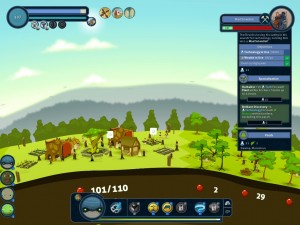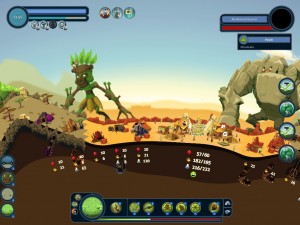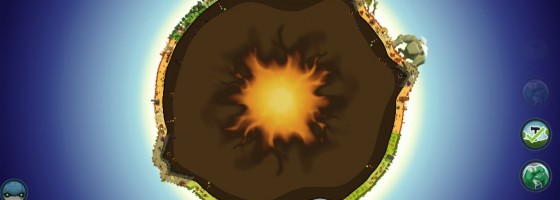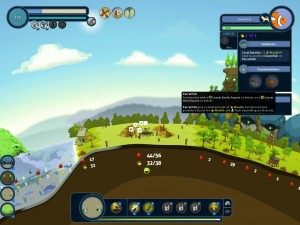Reus is the first release from the studio: Abbey Games and earned some buzz for its God-game like appearance and relaxing graphics. But don’t let the screenshots fool you, Reus isn’t a complete god-game nor is it all that relaxing and it leaves us with an interesting but limited experience.
Build a Planet:
In Reus you are a planet floating out in the great wide Universe somewhere with your goal to terraform your surface to the point of developing and sustaining life. To aid you are four giants that represent ocean, swamp, forest and mountain that will breathe life, alter the land and take out any unruly villages if the need arises.
Reus’s gameplay is a mix between strategy, city-building and light God-game design. Your giants can create (at this time) three types of habitable land: forest, swamp and desert. Using the giants you can enrich the land with the resources of food, wealth and technology by placing different animals, plants and minerals down.
Once one of the three resources have been settled, in a few seconds a town will form and grow based on the resources within its borders. The type of land will normally determine the focus of that town. For instance, swamps will normally produce more tech related projects compared to the other environments.
When a town has reached a suitable size, it will create a settler that will go to the next uninhabited environment with resources and found a new town. This repeats for as long as you have space available on your planet.
The challenge of developing your planet comes from city projects and managing greed. After a town has been founded, you’ll get an alert that the town wants to build a special building. There are a variety of buildings such as: granaries, trading houses and even mad scientist laboratories.

City projects challenge the player to meet the pre-requisites while providing new city specific bonuses.
Each building has specific pre-requisites that must be met by the city to complete it.
Completing a project will award you with an ambassador who you can assign to one of the giants unlocking a new power and generally make them better.
If a city grows too quickly or fails its city project, it will start to become greedy. When a city gets too greedy it will start attacking other cities and your giants.
Completing projects requires a lot of planning and resources which brings us to the meat of Reus’s gameplay.
Synergy Strategy:
You are not just managing your cities in Reus, but the types of resources within them. As mentioned, there are three categories of resources but there are over 100 types of resource producers in the game: deer, onyx, blueberries and so much more.
Every producer has a synergy affect with another producer. This in turn can either increase the number of resources it puts out or allows it to produce another resource at the same time. Further still, you can add growth bonuses or “aspects” from giants that can be used to upgrade the producer into something else.

The longer you play a single game, the harder it is to maintain a balanced growth while completing projects.
Using upgrades and synergy bonuses are the keys to completing the many city projects given the limited # of available plots within each village.
Truthfully it is a lot to take in and can easily overwhelm new players.
Fortunately the designers have figured that in to the design and pace of the game. When you first start playing the game, you’ll have a limited amount of producers available and can only play for 30 minutes at a time.
For every development (aka Achievement) you complete, will unlock new producers. Once you complete enough achievements, you’ll unlock the ability to play the game for 60 minutes, and then 120 minutes while unlocking more potential city projects and achievements to go after.
One area that Reus gets right about God-games and the city-building genre in general is controlling an ever escalating amount of chaos. The more you do to the world will add more cities to manage, projects to complete and synergies to balance.
However in trying to be a combination of so many genres, Reus doesn’t exactly hit the mark in terms of replayability and mastery.
Not so Renewable:
The two main problems with Reus come down to its replayability and lack of gameplay growth.
As mentioned, Reus’s unlock and achievement systems are tied together similar to one of my favorite games: The Binding of Isaac. The major difference is that in Isaac, achievements not only unlocked new items but changed the flow of the game dramatically: Adding new bosses, levels, difficulty and endings.
In doing so, Isaac’s gameplay depth grew as someone played it, but Reus doesn’t work that way.
Every new city project and producer doesn’t add any new depth to the game, but simply increases the options of what’s there.
You’re not going to be using any new mechanics in the game no matter how long you’ll play.
In this regard, Reus’s unlock system adds breadth, but not depth to the game and because of that, it limits the overall replayability. Unlike a city builder where the mechanics are complex enough to give the player freedom in building a variety of cities, Reus is limited. Once you have accomplished all the developments (or the ones you are willing to do,) there is nothing else to do but the free-play mode.
However, the game currently lacks the deeper mechanics to make such a mode rewarding. There are no multi-city projects or ways for cities to interact with each other outside of warfare. And with only three possible environmental types, limits how far you can go in terms of development. The focus of the game is entirely on the micro side, where traditional city-builders and God-games tend to build towards the macro.
According to a news piece on the developer’s site, they were looking to add deeper mechanics to the game but ran out of time and money. Hopefully the game has done well enough for them to continue working with this design.
For its price, Reus is an original game in a genre that we haven’t heard too much from. The base mechanics are interesting but the game is just missing that something special to make it amazing.



